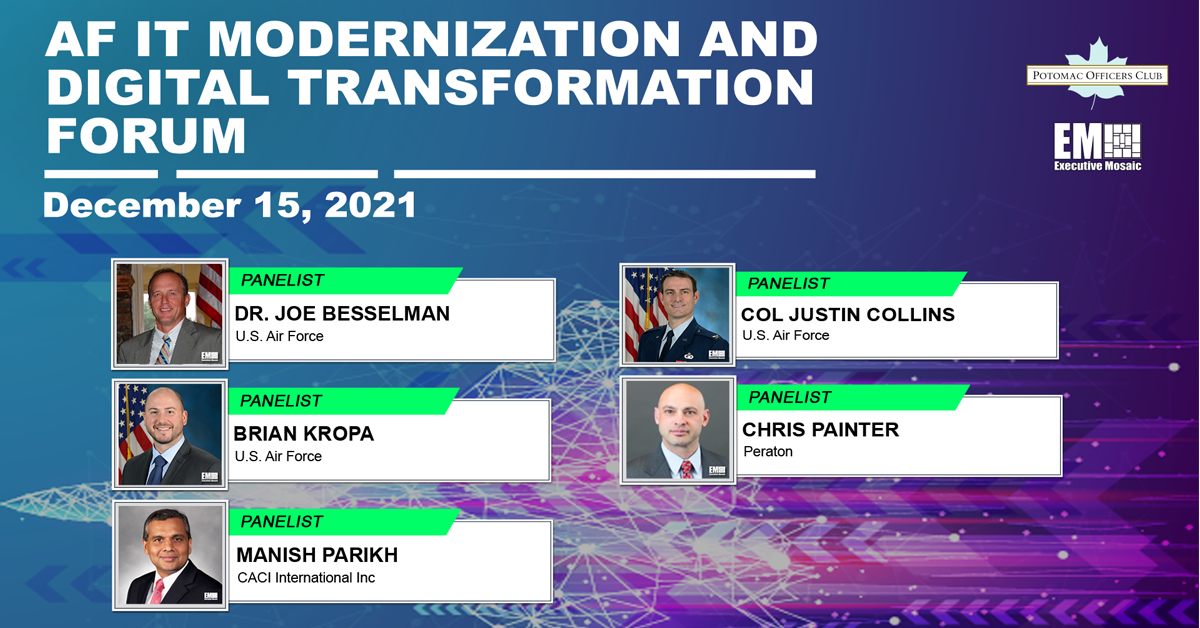The Potomac Officers Club hosted its Air Force IT Modernization and Digital Transformation Forum last Wednesday which joined elite U.S. Air Force and private sector leaders in spirited discussion on the critical modernization initiatives driving the Air Force’s current priorities, strategies and focus areas as the ongoing digitization of society continues to require transformational shifts in our nation’s capabilities.
Deputy Chief Information Officer for the Department of the Air Force, Winston Beauchamp kicked off the virtual event with an opening keynote address which provided the audience with a detailed look at how the service branch is leveraging industry partnerships to accelerate enterprise IT modernization in alignment with the Department of Defense’s Joint All-Domain Command and Control goals.
Following Beauchamp’s keynote, the program proceeded to an expert panel, moderated by CACI’s enterprise architect Jim Huso, which featured the Air Force’s Dr. Joe Besselman, Colonel Justin Collins and Brian Kropa, as well as Manish Parikh of CACI and Peraton’s Chris Painter, who gathered to explore the challenges the Air Force has faced over the past year, the insights these experts have gleaned in addressing them and what this means for the future of the Air Force in the digital age.
If you missed last week’s event, please visit PotomacOfficersClub.com to watch the full AF IT Modernization and Digital Transformation Forum on-demand now.
After each panelist gave a brief introduction of themselves, Jim Huso began the panel conversation by asking how the increase of telework due to COVID-19 has impacted the speed, integration and effectiveness of modernization initiatives across the Air Force and its private sector partners.
Colonel Justin Collins, HNI senior materiel leader for the Air Force Life Cycle Management Center, answered with, “COVID has fundamentally changed the way we do business. We know telework is here to stay.”
Col. Collins noted that there are service members and officials within the Air Force’s HNI who have not returned to a physical office since the onset of pandemic restrictions back in March of 2020, yet service has remained uninterrupted.
“I think a huge feather in our cap from an IT standpoint is being able to continue the mission in this crazy world that we live in today,” Col. Collins shared.
CACI International’s Manish Parikh, chief technology officer for the company’s business and information technology solutions sector, concurred that operations have been transformed, but in a positive direction.
“COVID has simply accelerated the government’s and industry’s pace to modernize our infrastructures,” he stated, noting that the drive to modernize was influenced both by technological advancements and workforce preferences.
Parikh went on to highlight three of the most pressing modernization issues influencing the federal and industry landscape today: transitioning workloads to a commercial cloud service provider, embracing zero trust principles and enabling secure communications on-the-go.
Next, Chris Painter, vice president and defense technical director at Peraton, addressed how pandemic-related modernization efforts have influenced the company’s service desk operations, which he explained have rapidly shifted to a virtual environment.
“We were able to work with one of our partners and get a virtual service desk capability where people could work at home,” Painter explained. “So that ensured that we had access to technicians and we could expand and track that support model.”
Painter also celebrated Peraton’s successes in the wake of swift changes. “We needed to get through contracts and execution very quickly, so everybody pulled out all the stops, and those efforts across the board were wildly successful in improving that end user-experience,” he said.
Huso then directed a question to Dr. Joe Besselman, program executive officer for command, control, communications, intelligence and networks for the Air Force.
When asked what is being done within the Air Force to keep end user experience a critical requirement and not an afterthought, Dr. Besselman pointed to Cloud One, hyper resiliency and cultural leadership shifts as key priorities along these efforts.
Dr. Besselman also cited the gap between commercial capabilities and federal capabilities as an important issue that needs to be addressed in the improvement of end-user experience.
“If customer experience is going to become real, then money needs to come behind it, but before that money comes, we’re going to have to turn over a leadership generation and get a leadership generation that understands we are in the 21st software century,” Dr. Besselman posited.
“Our bureaucracy has a culture that’s still locked into the 20th century and hasn’t figured out that we’re an IT organization,” he added.
Then, Brian Kropa, chief engineer for the Air Force Life Cycle Management Center/HNI, cited adoption and integration as two key areas where the Air Force needs to improve in order to get out from under its own infrastructure.
Additionally, Kropa said these two efforts can be accelerated with more robust public-private partnerships that leverage state-of-the-art technology that goes beyond traditional contractual obligations to further critical missions.
“I think there’s a lot of innovation and good ideas maybe left on the table that hide behind a contract, and getting to the point where we could pull those out more would be outstanding,” Kropa mentioned.
To hear the full panel discussion, please visit PotomacOfficersClub.com, where you can view the AF IT Modernization and Digital Transformation Forum and other GovCon events on-demand now.

The Potomac Officers Club’s 8th Annual Defense Research and Development Summit on Jan. 19 will gather federal and industry officials to discuss the key research and development priorities driving the Department of Defense’s current strategies, technological developments and focus areas as government agencies work to combat pacing challenges, bolster deterrence capabilities and better prepare our warfighters for the next generation of warfare.
Heidi Shyu, undersecretary of defense for research and engineering at the Department of Defense, will keynote the summit and share her insights on ensuring the technological superiority of the United States military force through cutting-edge R&D efforts.
Visit PotomacOfficersClub.com to register for the 8th Annual Defense R&D Summit on Jan. 19.






